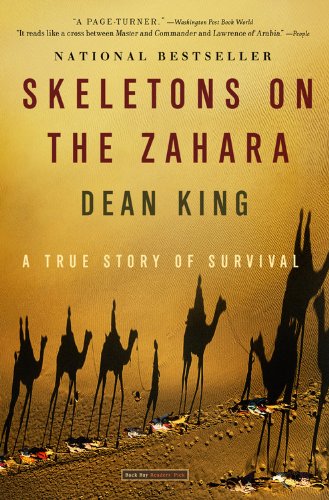From DHD – the riveting true story that inspired none other than Abraham Lincoln is headed for the big screen.
Captain James Riley was one of twelve American sailors shipwrecked in Africa in 1815. The sailors were taken prisoner, forced into slavery, and endured a punishing trek across the Sahara. Riley published his experiences two years later and the story caused a sensation – Abraham Lincoln said it was one of the books that had most influenced him alongside the Bible.
More recently, author Dean King recounted the story in his bestseller Skeletons on the Zahara, and now Ronan Bennett (Public Enemies) has been tapped to adapt the book for the big screen. Independent, the London-based sales company (Moon), is developing and producing.
If done right, this could be fantastic…
Book Description:
Everywhere hailed as a masterpiece of historical adventure, this enthralling narrative recounts the experiences of twelve American sailors who were shipwrecked off the coast of Africa in 1815, captured by desert nomads, sold into slavery, and subjected to a hellish two-month journey through the bone-dry heart of the Sahara. The ordeal of these men – who found themselves tested by barbarism, murder, starvation, death, dehydration, and hostile tribes that roamed the desert on camelback – is made indelibly vivid in this gripping account of courage, brotherhood, and survival.
Critics say:
“A wonderful, inspiring story of humankind’s will to survive in spite of inhospitable conditions and inhumane treatment, this work should be in all public libraries, maritime libraries, and African collections.”
– Library Journal
“King’s aggressively researched account of the crew’s once-famous ordeal reads like historical fiction, with unbelievable stories of the seamen’s endurance of heat stroke, starvation and cruelty by their Saharan slavers. King (Patrick O’Brian: A Life Revealed), who went to Africa and, on camel and foot, retraced parts of the sailors’ journey, succeeds brilliantly at making the now familiar sandscape seem as imposing and new as it must have been to the sailors. Every dromedary step thuds out from the pages with its punishing awkwardness, and each drop of brackish found water reprieves and tortures with its perpetual insufficiency. King’s leisurely prose style rounds out the drama with well-parceled-out bits of context, such as the haggling barter culture of the Saharan nomadic Arabs and the geological history of Western Africa’s coastline. Zahara (King’s use of older and/or phonetic spellings helps evoke the foreignness of the time and place) impresses with its pacing, thoroughness and empathy for the plight of a dozen sailors heaved smack-hard into an unknown tribalism. By the time the surviving crew members make it back to their side of civilization, reader and protagonist alike are challenged by new ways of understanding culture clash, slavery and the place of Islam in the social fabric of desert-dwelling peoples.”
– Publishers Weekly
“This shipwreck-and-survival saga occurred in 1815 in the wind-tortured territory of the modern Western Sahara and was promptly written down by American brigantine captain James Riley. So popular it appeared in six different editions, Riley’s account is revived here with the benefit of author King’s journey to retrace, in part, the 800-mile desert trek of Riley and his shipwrecked crew. King provides animated descriptions of the desert environment while covering the events Riley related, which included being sold into slavery. The dramatic incidents are supported with relevant details, such as the way the body reacts to dehydration and sun poisoning. Perhaps the story’s most intriguing element is the mutual understanding that developed between Riley and his eventual master, Sidi Hamet. A debt Hamet owed to his father-in-law propels the entire drama, as Hamet spirits his slaves through lands of scimitar-swinging brigands for ransoming to a Western consul. This is both a forcefully visceral and culturally astute account.”
– Booklist







Leave a Reply